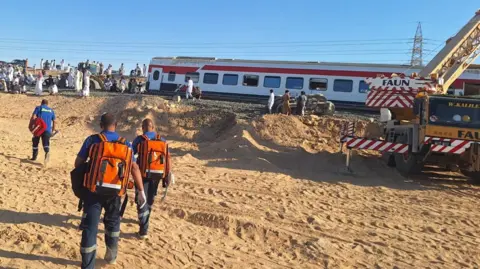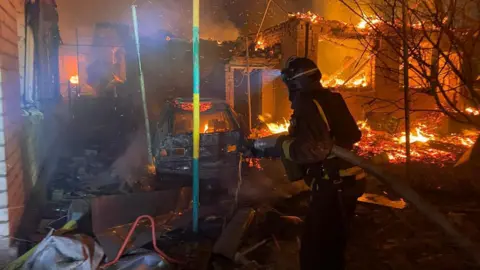In the face of severe wildfires, Greece is struggling to contain five major blazes that have forced the evacuation of residents from areas just 30 kilometers north of Athens. The harsh reality of the fires is underscored by reports of smoke and the smell of burning timber that has drifted into central Athens. This escalating crisis prompted Greek authorities to formally request assistance from the European Union for additional firefighting resources.
Greece’s Climate Crisis and Civil Protection Minister, Giannis Kefalogiannis, emphasized the urgent nature of the situation, stating, "We have injured firefighters, human lives were put at risk, properties have been burned, and forest areas have been destroyed." The combination of high winds and soaring temperatures, expected to reach as high as 44 degrees Celsius this Sunday, has compounded the challenges faced by firefighting teams.
In the region of Attica, the fire that ignited in Afidnes on Saturday quickly spread to neighboring areas including Drosopigi, Kryoneri, and Agios Stefanos, leading to the forced evacuation of numerous residents. While officials report that the main front of the fire has been contained, several hotspots remain active, posing ongoing risks.
On the island of Evia, a particularly aggressive fire has had catastrophic effects, rapidly advancing towards the village of Afrati and causing significant damage to infrastructure, including power lines and pylons. Six firefighters have been hospitalized due to burns and smoke inhalation as 115 personnel continue to fight this relentless firestorm. Local officials, such as Dirfyon-Messapion Mayor Giorgos Psathas, lament the "incalculable" destruction wrought by the flames.
Meanwhile, a third wildfire on Kythira has caused widespread devastation, prompting additional evacuations and leading to rescue operations by the coastguard for affected residents. In Messinia, a fourth wildfire has been difficult to control due to strong winds, resulting in multiple emergency alerts urging villagers to evacuate.
The fifth blaze is impacting the region of Chania in Crete, where two separate sources have merged into a substantial fire that has already destroyed homes. As conditions worsen, many regions across Greece remain under threat from fires, including the Ionian Islands, Peloponnese, and Thessaly.
This summer’s wildfires have led to substantial losses, previously seen on the island of Chios, which lost over 4,700 hectares of land last month, along with mass evacuations that affected thousands of tourists on Crete just weeks ago. The ongoing crisis reveals not only the immediate dangers posed but also the long-term implications for communities and the environment in Greece.
Greece’s Climate Crisis and Civil Protection Minister, Giannis Kefalogiannis, emphasized the urgent nature of the situation, stating, "We have injured firefighters, human lives were put at risk, properties have been burned, and forest areas have been destroyed." The combination of high winds and soaring temperatures, expected to reach as high as 44 degrees Celsius this Sunday, has compounded the challenges faced by firefighting teams.
In the region of Attica, the fire that ignited in Afidnes on Saturday quickly spread to neighboring areas including Drosopigi, Kryoneri, and Agios Stefanos, leading to the forced evacuation of numerous residents. While officials report that the main front of the fire has been contained, several hotspots remain active, posing ongoing risks.
On the island of Evia, a particularly aggressive fire has had catastrophic effects, rapidly advancing towards the village of Afrati and causing significant damage to infrastructure, including power lines and pylons. Six firefighters have been hospitalized due to burns and smoke inhalation as 115 personnel continue to fight this relentless firestorm. Local officials, such as Dirfyon-Messapion Mayor Giorgos Psathas, lament the "incalculable" destruction wrought by the flames.
Meanwhile, a third wildfire on Kythira has caused widespread devastation, prompting additional evacuations and leading to rescue operations by the coastguard for affected residents. In Messinia, a fourth wildfire has been difficult to control due to strong winds, resulting in multiple emergency alerts urging villagers to evacuate.
The fifth blaze is impacting the region of Chania in Crete, where two separate sources have merged into a substantial fire that has already destroyed homes. As conditions worsen, many regions across Greece remain under threat from fires, including the Ionian Islands, Peloponnese, and Thessaly.
This summer’s wildfires have led to substantial losses, previously seen on the island of Chios, which lost over 4,700 hectares of land last month, along with mass evacuations that affected thousands of tourists on Crete just weeks ago. The ongoing crisis reveals not only the immediate dangers posed but also the long-term implications for communities and the environment in Greece.




















